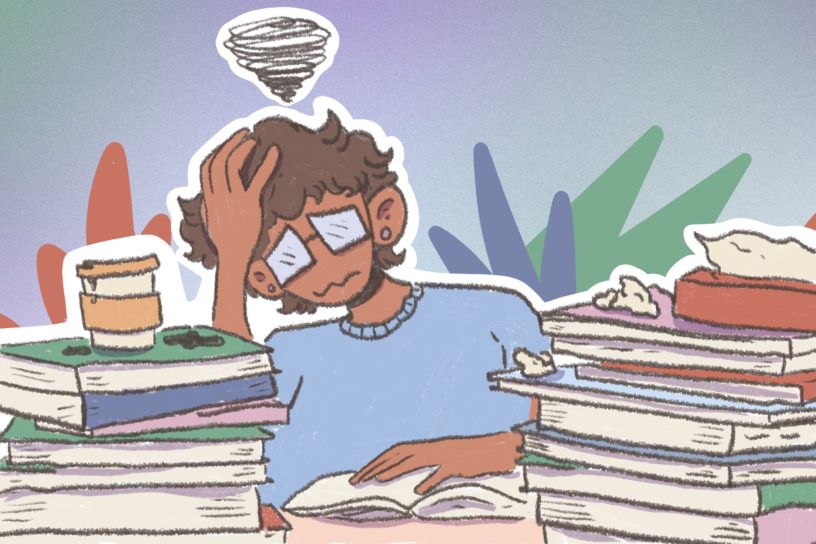By Shaye-Love Salcedo
Disclaimer: No students (or textbooks) were harmed in writing this article. Please study responsibly and do not try any of these methods at home.
With September already halfway done, workloads are piling up and so is the anxiety. Gone are the days of mere coffee-fuelled all-nighters—Toronto Metropolitan University (TMU) students are taking study habits to new and extreme heights. From ancient rituals of self-sacrifice to transforming into academic monks, the student body is pushing the very boundaries of productivity.
Edward Whittaker, a fourth-year business management student, has taken “academic sacrifice” to a disturbing new level.
“You skip a required reading, you lose a finger. I don’t make the rules,” he declared while gesturing toward an ominous guillotine peeping from beside his desk. “I got this beauty from eBay. An authentic 17th century one, of course.”
Whittaker’s method, which he calls the “Finger-for-Failure System,” involves the merciless loss of a digit for each textbook chapter he doesn’t complete by midnight. He’s managed to retain all 10 fingers thus far, though he admitted to nearly losing a pinky over a missed accounting chapter.
“You skip a required reading, you lose a finger. I don’t make the rules”
“It’s motivation,” he said nonchalantly, holding up his hand for display. “Some people use planners, others use alarms—I use a deadly historical artifact for my study needs.”
Whittaker hesitated when asked what he planned to do for finals before whispering, “Let’s just say there’s a reason I’m taking anatomy next semester.”
Over at the Daphne Cockwell Complex (DCC), third-year philosophy student Faye Donjon has barricaded herself in the lofty heights of the tallest tower on campus.
Due to the nature of her situation, Donjon granted permission for The Eyeopener to scale the walls of the DCC and conduct the interview from her windowsill.
“It’s like a self-imposed exile,” she explained, peering out several floors above Gould Street. “Instead of avoiding a curse, I’m dodging Netflix and TikTok—it’s all waiting for me down there.”
Donjon has lived in the DCC tower for over two weeks, sustained entirely by farmer’s wraps from Tim Hortons on Victoria Street chucked through the window by sympathetic friends. Her hair has grown out in a way that suggests she’s one essay away from becoming a philosophy professor and her eyes—well, they tell the tale of someone who’s read too many footnotes.
“I’ve removed all distractions,” she said, gesturing at the deserted room behind her. “No internet, no music, no social interaction. It’s just me, my books and my determination to write that 5,000-word essay on postmodernism. If I don’t finish it by the end of the week, I’m never coming down.”
Her friends, who occasionally huddle below to offer emotional support—and Skittles— have begun organizing a rescue mission. Donjon, however, remains vigilant in her academic lockdown.
“Once I finish all my readings,” she said with a defiant glint, “I’ll lower myself down with my hair—or take the elevator if it’s working.”
“If I don’t finish it by the end of the week, I’m never coming down”
Third-year aerospace engineering student Evan Glider has taken a more adrenaline-fuelled approach to his study habits.
“You haven’t truly studied until you’ve done it while free falling at 200 kilometres an hour,” Glider said as he tightened the straps on his skydiving gear.
Glider, who skydives daily in preparation for his midterms, claims the rush of plunging towards the earth helps him focus.
“My friend once told me to take a break from studying and touch grass, but now I get to fall on it with my flashcards,” he said while attaching a laminated set of flashcards on calculus equations to his parachute harness.
“You haven’t truly studied until you’ve done it while free falling at 200 kilometres an hour”
Though some students question his methods’ practicality or legitimacy, Glider insists skydiving has revolutionized his study habits.
“If I can solve physics problems mid-dive, everything else feels…slower,” he said. “My brain operates on a higher frequency now.”
The TMU community doesn’t doubt that students will strive for maximum excellence, but what do faculty think of students’ efforts to get that A+?
Carl Marks, a philosophy professor, is appalled at students’ behaviour toward studying.
“I always encourage students to deep dive into the material, but I didn’t mean literally,” he said, flipping through his syllabus as if searching for a hidden clause. “We’re getting reports of students isolating themselves like medieval monks. I don’t know if they’re trying to find enlightenment or avoid doomscrolling on TikTok for six hours.”
On the other hand, Issac Neutron, a physics professor, fully supports the unconventional study methods on campus.
“There’s something inspiring about watching a student study while falling to earth with colour-coded flashcards,” he said with genuine admiration. “It’s like witnessing a modern-day intellectual daredevil—except instead of thrills, they’re calculating the slope of their success.”
Neutron has approached the university’s Senate on adding an ‘extreme study methods’ bonus to his syllabus next semester.
“That kind of commitment deserves recognition,” he said. “After all, who wouldn’t want a little extra credit for defying gravity while defying expectations?”












Leave a Reply